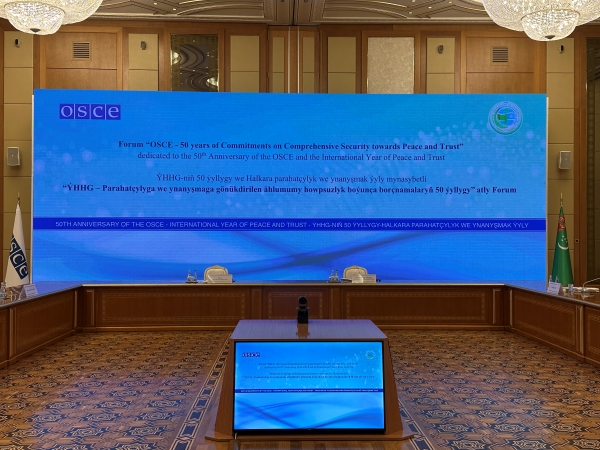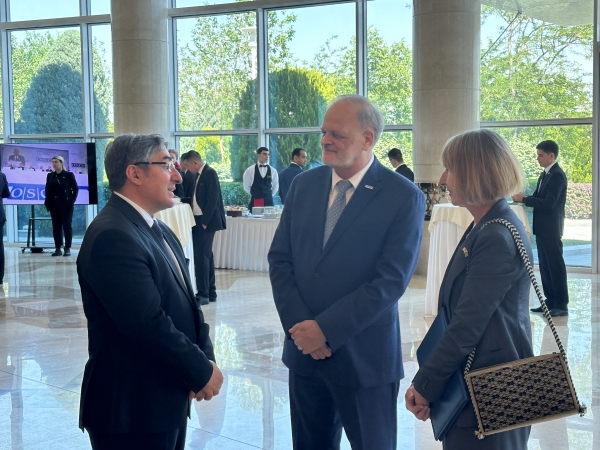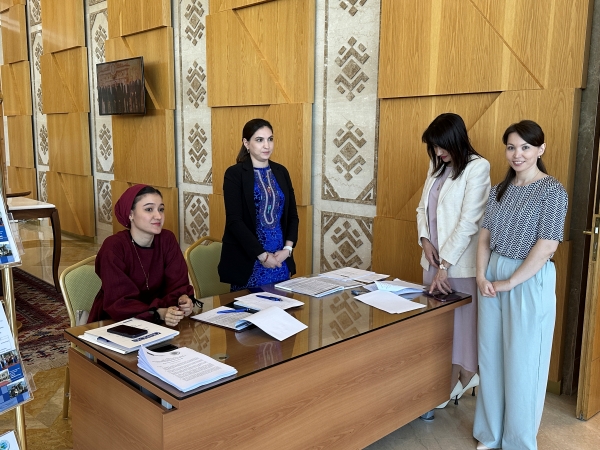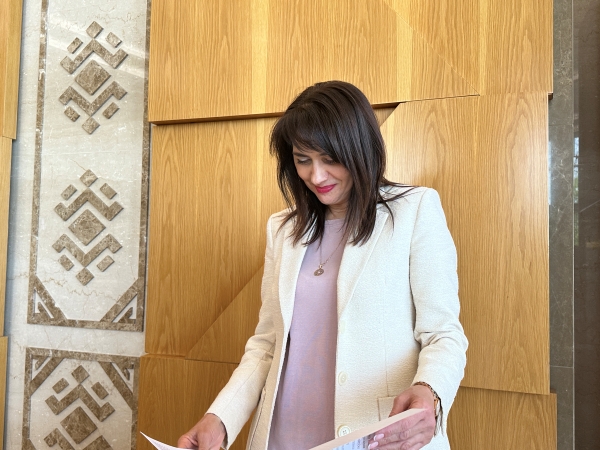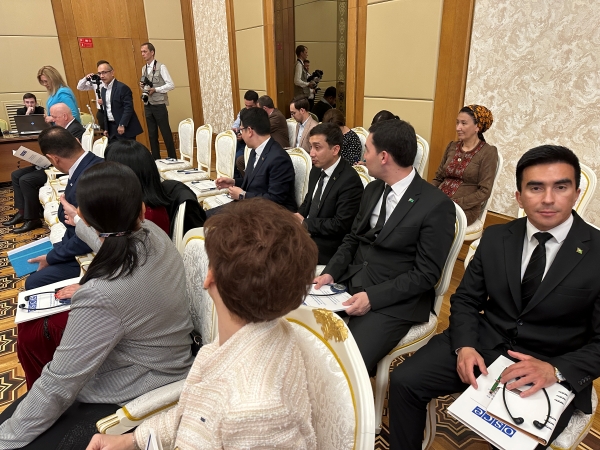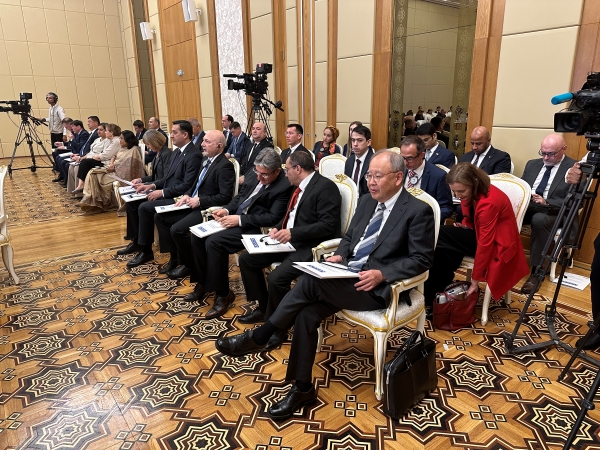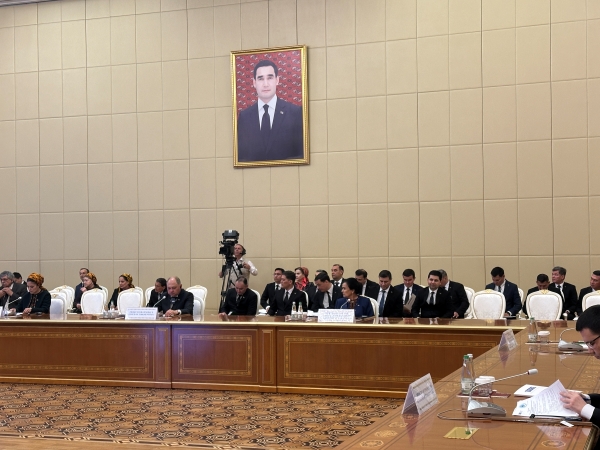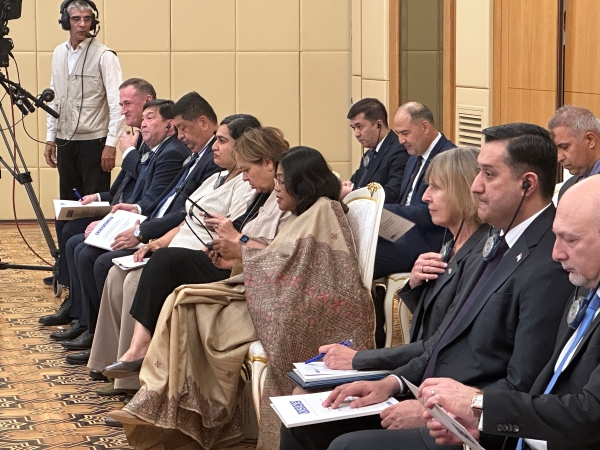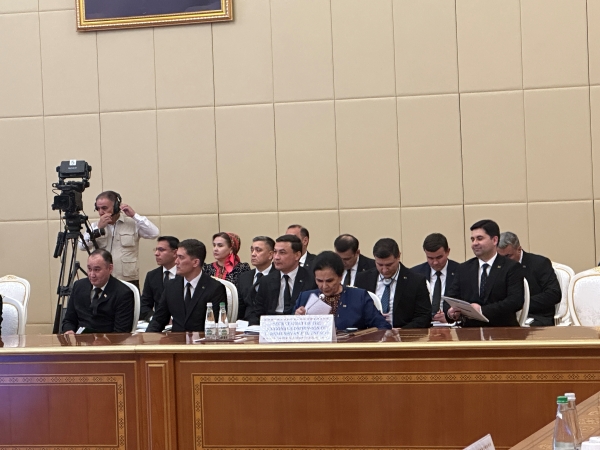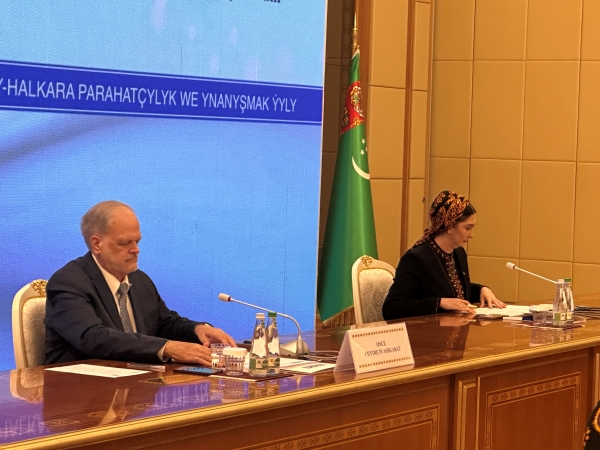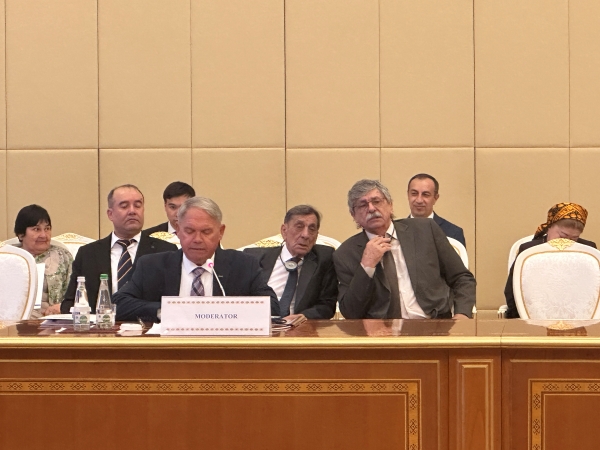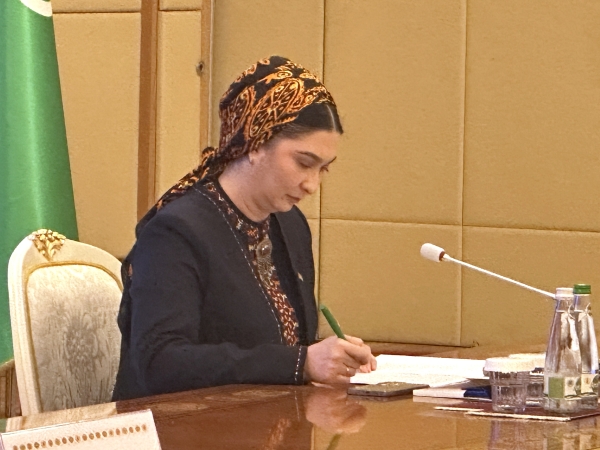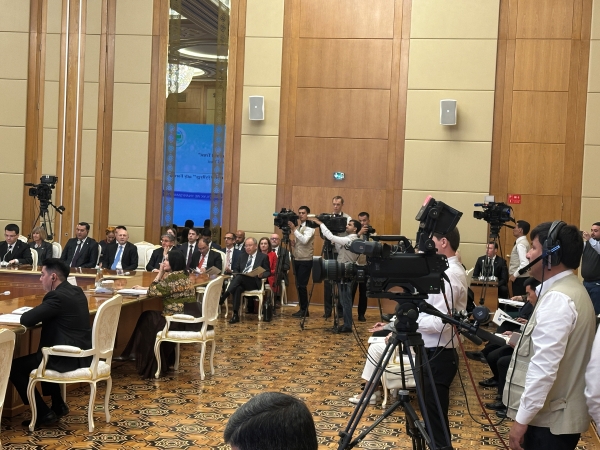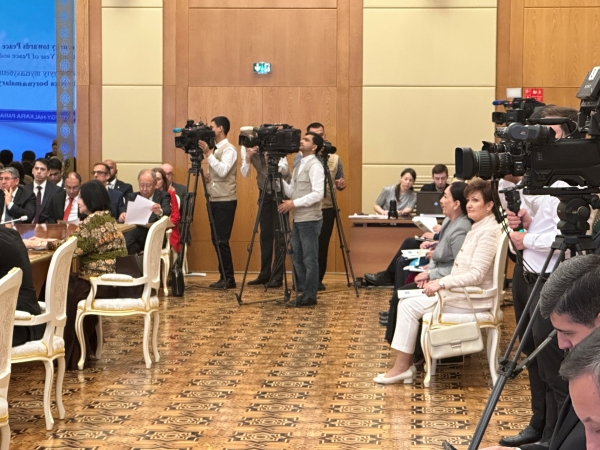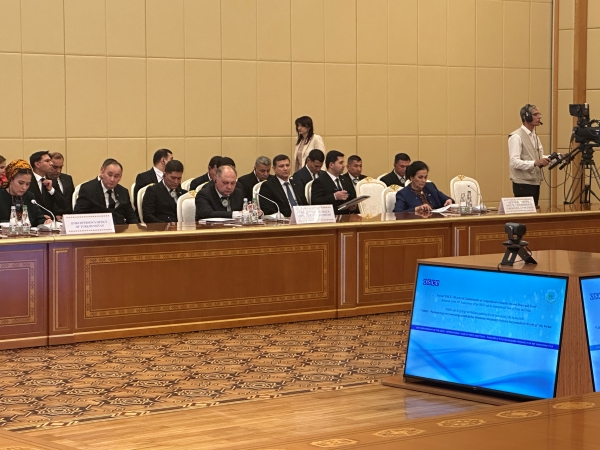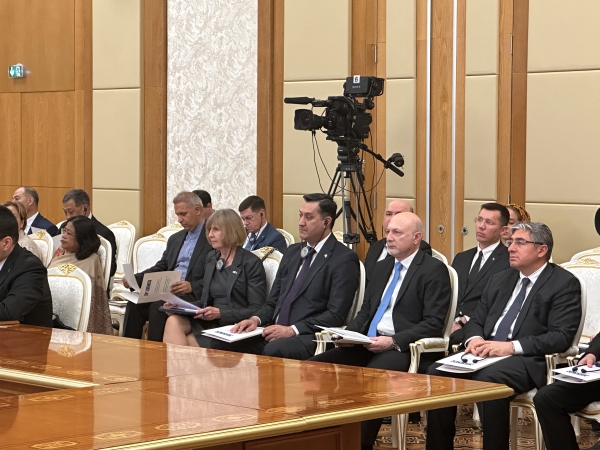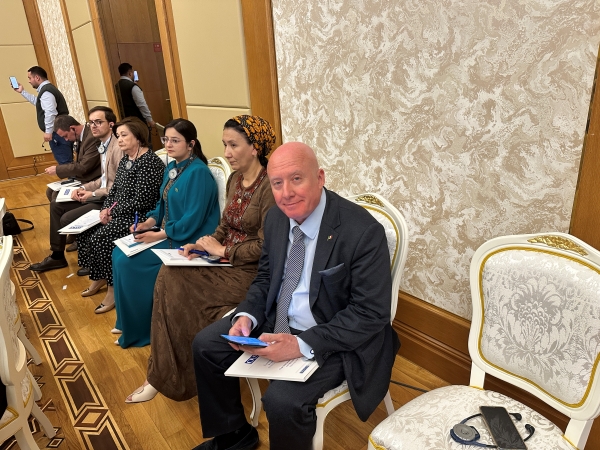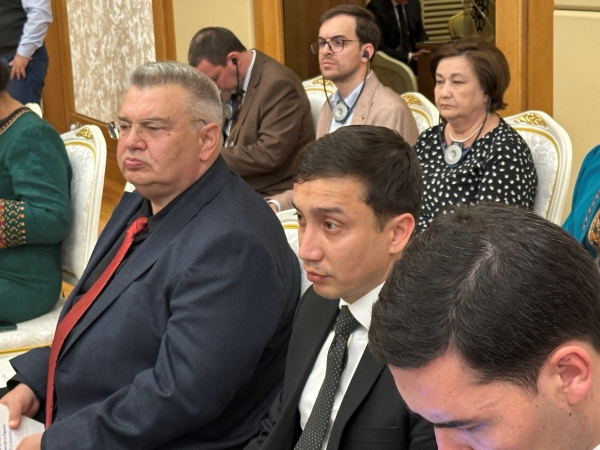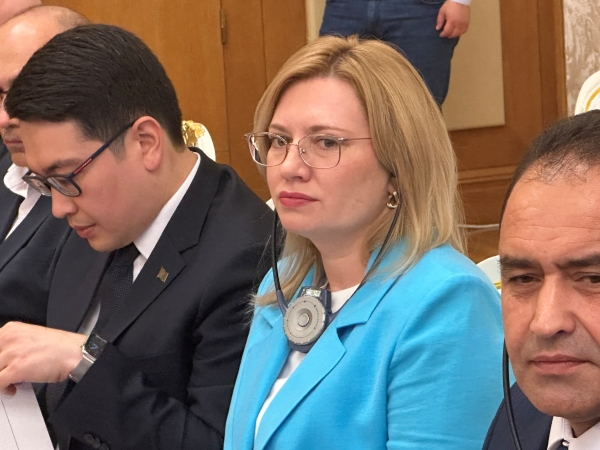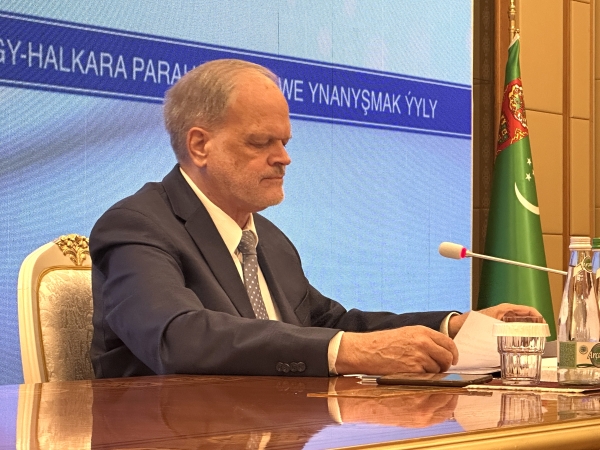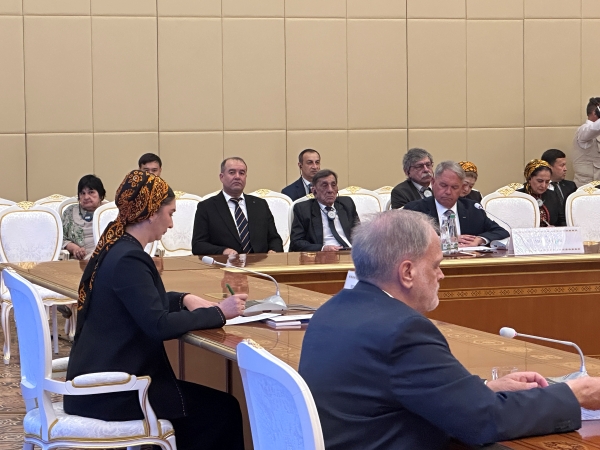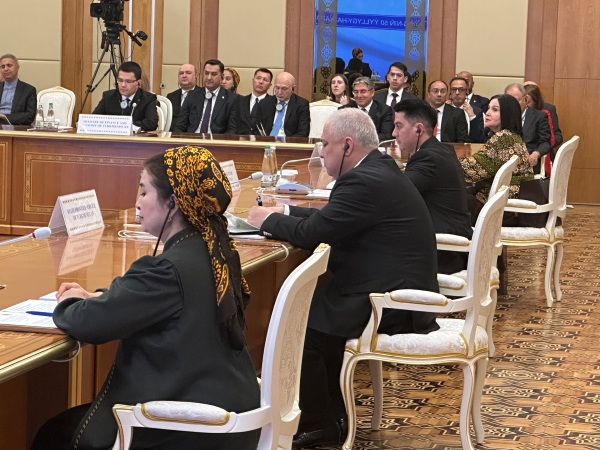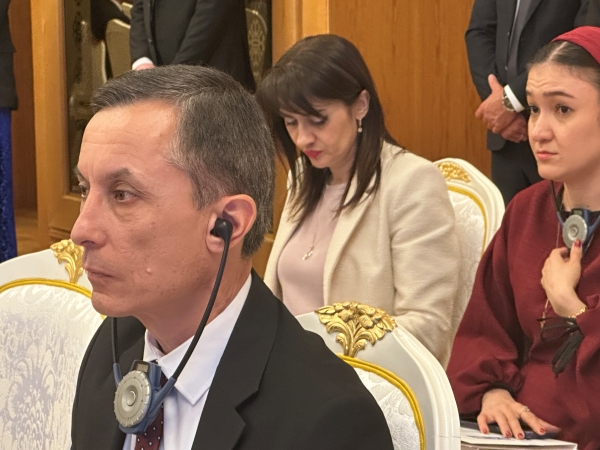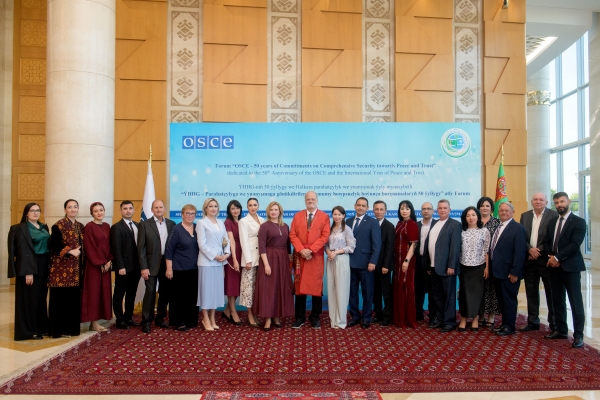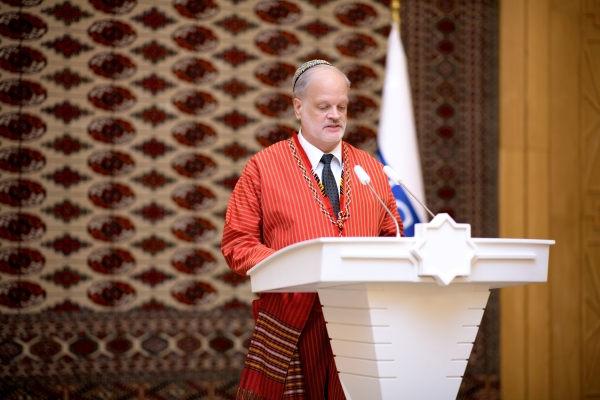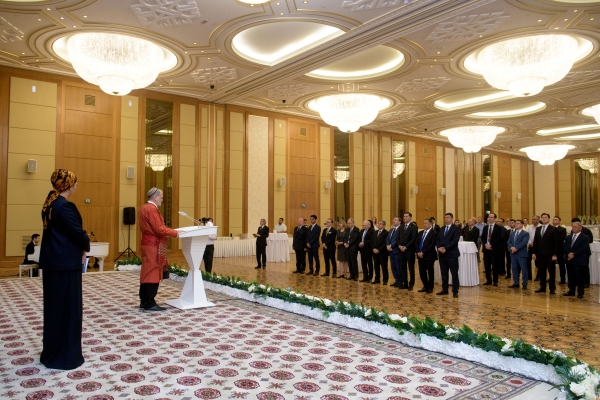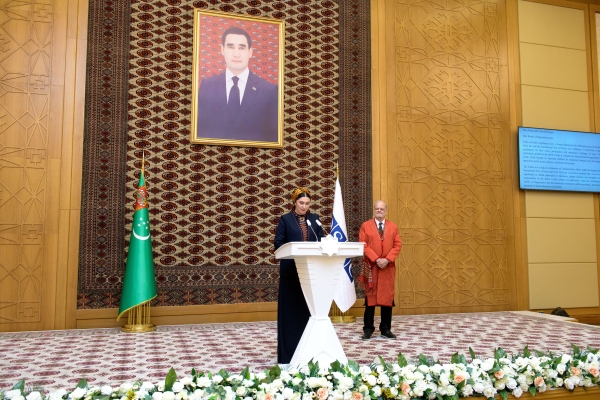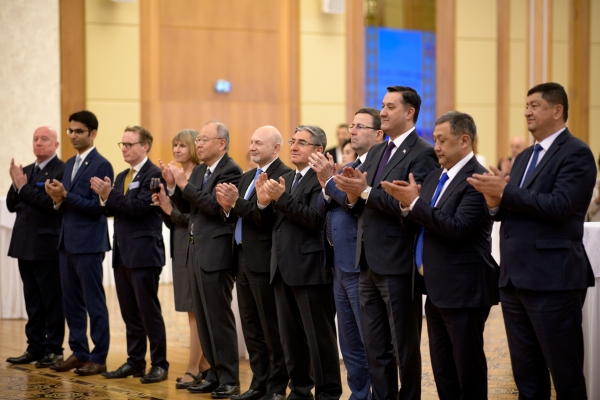nCa News and Commentary
As OSCE turns 50 this year, the OSCE Centre in Ashgabat hosted a forum and a reception to mark the Golden Jubilee.
Actually, it is the 50th anniversary of the Helsinki Final Act that was concluded in 1975 and led to the creation of CSCE (Conference on Security and Co-operation in Europe). The CSCE transformed into OSCE (Organization for Security and Cooperation in Europe) in 1995, in the aftermath of dissolution of the USSR.
The forum on 22 April 2025, organized in cooperation with the foreign office of Turkmenistan, was held under the theme “Relevance of 50 years of OSCE Commitments on Comprehensive Security as a component of Peace and Trust, the OSCE and Turkmenistan.”
In this report we will quote the speech of Ambassador John Macgregor in full, include major parts of the concept note for the forum, copy a press release by OSCE, and conclude with our own commentary. This will entail some duplication but is necessary to highlight the importance of the occasion and the future of OSCE.
Press release of OSCE:
(https://www.osce.org/project-coordinator-in-uzbekistan/589850)
OSCE and Turkmenistan mark 50th anniversary of the Helsinki Final Act and the International Year of Peace and Trust
22 April 2025
To mark the 50th anniversary of the signing of the 1975 Helsinki Final Act and the International Year of Peace and Trust designated by the UN General Assembly’s Resolution at the initiative of Turkmenistan, the OSCE Centre in Ashgabat together with the .Foreign Ministry of Turkmenistan organized a high-level forum in Ashgabat on 22 April.
The forum provided an opportunity to reflect on the historical foundations and commitments of the OSCE. The speakers underscored the importance of key provisions of the Helsinki Final Act, particularly the Helsinki Decalogue, which sets out the ten guiding principles that OSCE participating States have agreed to uphold to foster mutual relations. These principles remain just as relevant today as they were 50 years ago.
“The organization of the forum on the 50th anniversary of the Helsinki Final Act in the context of the International Year of Peace and Trust is no coincidence. It is a highly symbolic event that allows us to look at the historical path of the OSCE through the prism of contemporary efforts to promote peaceful diplomacy and inter-State relations based on trust,” said the Deputy Minister of Foreign Affairs of Turkmenistan, Myahri Byashimova, in her opening remarks. “Turkmenistan views the OSCE as the most important international platform uniting States on the basis of common principles and commitments in the areas of security, economic development and environmental protection, human rights and the rule of law,” she added.
The forum also highlighted the priorities of the OSCE 2025 Chairpersonship, and raised awareness, among national institutions and diplomatic missions, about the importance of co-operation between Turkmenistan and the OSCE.
“In the context of the OSCE’s co-operation with Turkmenistan, I would like to emphasize how Turkmenistan’s foreign policy, in synergy with OSCE principles and commitments, have significantly contributed to advancing dialogue, understanding, confidence building, trust and peace,” said John MacGregor, Head of the OSCE Centre in Ashgabat
Speakers from key national partner institutions presented tangible achievements of this partnership across the OSCE’s three dimensions of security: the politico-military, economic and environmental, and human dimensions. The speakers emphasized the relevance of OSCE commitments on comprehensive security as a component of peace and trust.
The forum brought together about eighty representatives from Turkmenistan’s state institutions, universities and public organizations, and partners of the OSCE Centre in Ashgabat, as well as members of the diplomatic corps.
Speech by Ambassador John S. Macgregor:
[The initial part of the speech of Ambassador Macgregor was in the Turkmen language. His concluding remarks were both in the Turkmen and English language.]
As I continue, in English, I offer my thanks to the Ministry of Foreign Affairs of Turkmenistan, and to the Deputy Minister, personally, for supporting and joining this Forum to observe the 50th anniversary of the OSCE’s Helsinki Final Act.
As we continue our work at the nexus of OSCE commitments and national priorities, we absolutely acknowledge that none of our work would be possible without the the ongoing and critically important efforts and support of the esteemed Ministry.
I want to repeat and stress that the project work of the OSCE Centre in Ashgabat is at the nexus of OSCE commitments and the national priorities of Turkmenistan. That is what makes the OSCE so unique and special, and such an asset in OSCE host States.
As an OSCE official for 18 years and a Head of Mission for nine years, I have been deeply privileged to have been able to spend the last four years leading the work of the OSCE in Turkmenistan.
As such, I am deeply honoured to be able to address you this afternoon.
Esteemed partners, officials, and guests,
I’d like to take you back 50 years, as the representatives of the founding States were engaged in the work to establish the OSCE.
I remember learning of the Helsinki Conference on Security and Co-operation in Europe 50 years ago.
At the time of the signing of the Helsinki Final Act in the summer of 1975, I had already been wearing the uniform of a Canadian Naval Officer for over a year.
I can personally recall my astonishment at the news coming out of Helsinki, that what was “East” and “West” – the Warsaw Pact and NATO – had reached agreement on a major document that established what we now know as the OSCE, and what is now the world’s largest regional security organization (established under Chapter 8 of the UN Charter), and now representing one-billion people in our part of the world.
Clearly, this was an extraordinary and even visionary agreement in the annals of human history.
The founders of the OSCE followed a process:
• Dialogue – leads to Understanding
• Understanding – leads to building Confidence
• Confidence – leads to trust
• Trust – leads to less conflict
• Less Conflict – leads to Security and Peace
Now, we all understand that we don’t always achieve peace, and certainly that’s the case in the OSCE area today.
However, that does not stop us from trying.
The fact of conflicts in the OSCE area, today, does not stop dialogue.
It does not stop us reaching for understanding.
It does not stop us attempting to build confidence.
It does not stop trying to achieve trust.
It does not stop us working to prevent conflict.
And, the OSCE continues to use its convening power to gather representatives from the 57 participating States in various fora, inter alia including special conferences, and OSCE Ministerial Council and Permanent Council meetings, with the goal to end conflicts and aim for security and peace.
But, it all starts with DIALOGUE.
The dialogue takes place in various forms, with differing goals and aims, pursuing measurable goals, and still following the process practiced 50 years ago.
In fact, as the diplomatic representatives gathered 50 years ago, they established what are referred to as “Decalogue” or the “Helsinki Principles.”
You will hear the current OSCE Chair-in-Office, HE madam Elina Valtonen, refer to the Helsinki Principles in her speech. As she says, “If the Helsinki Principles did not already exist, they would need to be written now.”
What are they?
The ten Helsinki Principles are:
1. Sovereign Equality of States,
2. Refraining from threat or use of force,
3. Inviolability of State Borders,
4. Territorial Integrity of States,
5. Peaceful Settlement of Disputes,
6. Non-intervention in internal affairs, while providing that participating States are responsible to each other for the implementation of OSCE commitments,
7. Respect for Human Rights and fundamental freedoms,
8. Equal Rights and self-determination,
9. Co-operation among States, and
10. Good faith fulfilment of international legal obligations.
Esteemed Officials and Guests,
I have mentioned dialogue, but the OSCE goes beyond dialogue to action.
In my 18 years as an OSCE official, in many locations, I have seen first-hand, with my own eyes, some of the impact that the OSCE has had, directly or indirectly changing the lives of hundreds of thousands or even millions of people.
I have seen the establishment and long-term institutionalization of more effective and efficient methods of public assembly management.
I have seen the establishment and long-term institutionalization of new methods and standards of judicial education and accountability, effectively updating justice and the rule of law.
I have seen how the OSCE monitored and reported on conflict situations, becoming a trusted source of information.
I have seen how the actions of the OSCE, using many of the available the tools in the OSCE conflict prevention toolbox, prevented conflict between OSCE participating States for the entirety of the time they were permitted to be in the geographic area.
How do I know that conflict was prevented?
At some point, it was decided (and I won’t go into the detail), that the OSCE’s efforts were no longer welcomed at the particular time and in that particular place.
As a result, very sadly, the conflict re-started.
Esteemed participants,
In the context of the OSCE’s co-operation with Turkmenistan, I have seen how the actions and foreign policy of Turkmenistan, in synergy with OSCE principles and commitments, have significantly contributed to advancing dialogue, and understanding, and confidence building, and trust, and even peace.
As a case in point, it is useful to note the new UN General Assembly Resolution on the “Permanent Neutrality of Turkmenistan,” adopted by unanimous consent on 21st March 2025, one month ago.
In addition, it is important to note the UN General Assembly Resolution adopting the Turkmenistan initiative to declare 2025 as the “International Year of Peace and Trust.”
Turkmenistan, by its actions and example of permanent positive neutrality, is actively pursuing Peace and Trust on the global stage.
It is certainly no coincidence that 2025 marks:
• the 80th anniversary of the United Nations,
• the 50th anniversary of the OSCE’s Helsinki Final Act, and
• the 30th anniversary of the first UN General Assembly resolution on the permanent neutrality of Turkmenistan.
It is telling that Permanent Neutrality is a constitutional imperative of Turkmenistan, but it also stems from the historical heritage and traditions of the Turkmen people, related to:
• dialogue,
• mutual respect,
• good neighbourly relations,
• trust, and peace.
Esteemed and honoured participants of this Forum,
The OSCE certainly recognizes and supports all efforts to pursue:
• Effective communication, leading to dialogue,
• Dialogue leading to confidence building and mutual respect,
• Confidence building and mutual respect leading to Trust,
• Trust leading to peace, and
• Peace that builds security and stability for all peoples of all States…
• For the one billion people of the OSCE area, and globally.
Clearly, Turkmenistan, with its global leadership of institutionalizing and practicing positive Permanent Neutrality, pursues those very same goals that the OSCE is trying to achieve.
As I said in Turkmen language, I offer congratulations on my behalf and on behalf of the OSCE. We can only applaud the efforts of Turkmenistan.
SO, as we look back on the impact of the OSCE’s first 50 years and the first 30 years of Turkmenistan’s permanent neutrality, where do we go from here?
We know that we want the best for our children, and our grandchildren, and our great-grandchildren. They are the generations who will succeed us, here in Turkmenistan, and globally.
It is up to us to give them the best possible world. A world that is safe, and secure.
Politically and militarily secure.
Economically secure.
Environmentally secure.
A world where girls feel as important as boys.
This is what the OSCE is trying to do in North America, and in Europe, and in Asia.
This is what the OSCE is trying to assist Turkmenistan to achieve.
Let us continue our active co-operation aiming at our mutual goals.
I congratulate all the people of Turkmenistan with this important year.
From the Concept Note of the Forum
4. The purpose of the Forum would be to review the historical basis of the OSCE, the concept of OSCE Ministerial and Permanent Council Decisions (OSCE Commitments), and the key initial documents related to the Helsinki Final Act inter alia including the ‘decalogue.’ The Forum would also include discussion of the Relevance of 50 years of OSCE Commitments on Comprehensive Security as a component of Peace and Trust, and an overview of some key positive impacts of OSCE projects and activities across the 57 participating States.
5. Additional attention would be paid to the priorities of the OSCE 2025 Chairpersonship, and also to the constantly increasing co-operation and partnership between the OSCE and Turkmenistan. Clearly, it would also be appropriate to refer to the year of 2025 being the 30th anniversary of the first UN GA resolution on the neutrality of Turkmenistan, the second similar resolution in 2015, and the most recent, third UN GA resolution related to Neutral Turkmenistan dated 21 March 2025.
[. . .]
12. The primary objectives of the Forum Dedicated to OSCE @ 50, During the International Year of Peace and Trust are as follows:
a. Facilitate communication and dialogue among officials of the OSCE and Turkmenistan to learn what has worked in the past, what has not met objectives, and consider lessons learned to facilitate the creation of a ‘future ideas potential project and future co-operation compendium.’
b. Foster discussions on improving current partnership and co-operation to further develop and expand synergies that will advance the joint and parallel goals of Turkmenistan and the OSCE.
c. Raise awareness, among the diplomatic corps and Turkmenistan officials, of the advantages and possibilities of OSCE-Turkmenistan partnership and co-operation.
nCa Commentary by Tariq Saeedi
As far as Central Asia is concerned, the history of OSCE begins in 1995. —– This is the Silver Jubilee year of the OSCE presence in the region.
If OSCE were a person and you met them in 1995, you will not be able to recognize them now. There has been something close to metamorphosis in the persona of OSCE.
There is the collision of perceptions, and there is the merger of realities.
It was perceived by some that the collapse of the Soviet Union had created some kind of vacuum. The corollary to that perception was that Europe was able and willing to fill that vacuum instantly.
We don’t know, and don’t want to make any guess about the genetics and structure of this perception. What we know is that in the early years, the OSCE and its host countries in Central Asia were in an uneasy relationship.
There were several reasons for this.
The early heads of OSCE Centres in the region were seemingly in a hurry to impose a cookie-cutter European model in the region. Mostly, they lacked a deep knowledge of the region and assumed that one side (OSCE) was dynamic and the other side (host country) was inert. They didn’t believe in Newton’s Third Law that for every action there is an equal and opposite reaction. — The region pushed back.
The history of ‘Color Revolutions’ around that time gets entangled with the history of the activities of OSCE in the CIS space and there is some element of truth to that.
However, OSCE, to its credit, went into self-correction mode around 2010.
The purpose and charter remain the same but the interpretation has changed significantly. The OSCE Centres across the region are now valuable partners in the development journey of the host countries though some doubts still linger.
The quality of the partnership between OSCE and the host country depends greatly on the head of the Centre. In Ashgabat, this has been visible during the tenure of John MacGregor. His full career in the Canadian Navy and his long association with the OSCE give him a distinctive edge over his contemporaries. He has built trust with the host government that will continue to serve as the foundation of partnership for years to come.
On the other hand, OSCE is slowly choking itself because of its budget mechanism. It is the Achilles heel of this wonderful organization.
The OSCE’s budget is funded by contributions from its 57 participating States, allocated based on an agreed scale of contributions that reflects economic factors like GDP. The Unified Budget, approved periodically covers the organization’s core activities, including Secretariat in Vienna, which handles administrative and coordination functions, the Independent Institutions, such as the Office for Democratic Institutions and Human Rights (ODIHR), the High Commissioner on National Minorities (HCNM), and the Representative on Freedom of the Media. It also covers Field Operations, including missions and centers in participating States, and Programmatic Activities, such as conflict resolution, election monitoring, and border security.
Since 2021, the OSCE has faced challenges in adopting a Unified Budget due to lack of consensus, relying instead on stopgap funding measures like monthly allotments, which create inefficiencies and hinder long-term planning.
The OSCE operates on a ‘consensus-based decision-making model,’ a core principle since its establishment, which applies to major decisions, including the approval of the Unified Budget. This consensus rule requires all 57 participating States to agree, effectively granting each state a ‘de facto veto’ over budget approval.
Under the OSCE’s consensus-based decision-making process, a veto by any one of the 57 participating States can block the approval of the Unified Budget. The consensus rule, often described as part of the OSCE’s “DNA,” ensures that all states have equal say, but it also allows a single state to obstruct decisions, including budget adoption. This has significant implications.
The inability to approve a budget affects all OSCE activities, including field missions and centers, as their funding is tied to the Unified Budget. For instance, the lack of an approved budget has led to challenges in maintaining staff and planning activities, weakening the organization’s ability to fulfill its mandate. It also prompts workarounds, such as voluntary contributions for specific programs, to bypass vetoes.
There is the urgent need to rectify the budget mechanism and free it from the stranglehold of the ‘de facto veto.’ /// nCa, 23 April 2025
Here are some pictures from the forum and the reception:
